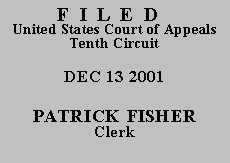

Petitioner-Appellant Dennis Michael Varnado, an inmate appearing pro se,
appeals from the district court's denial of his habeas petition filed pursuant to 28
U.S.C. § 2241. The district court rejected his claim that the Bureau of Prisons
(BOP) erred in calculating his sentence, specifically that the federal sentencing
court intended that he serve his federal concurrently with a prior state sentence.
Mr. Varnado seeks recalculation of his federal sentence and credit towards his
federal sentence for prior custody.
Defendant was arrested on November 14, 1988 in Oregon. An Oregon
state court sentenced Mr. Varnado to concurrent five-year prison terms. The
federal government then charged him with being a felon in possession of a
firearm. On May 21, 1990, an Oregon federal district judge sentenced Mr.
Varnado to 71 months in prison. The BOP determined that the federal sentence
began on February 15, 1991, when Oregon released him. Then, on September 8,
1992, after he had begun serving his federal sentence, Judge Redden resentenced
Mr. Varnado to 180 months in prison on the federal charge. The BOP
determined not to count against his federal sentence the time that he already spent
in State custody.
"Multiple terms of imprisonment imposed at different times run
consecutively unless the court orders that the terms are to run concurrently." 18
U.S.C. § 3584(a). Despite the lack of indication in the judgment, Mr. Varnado
contends that Judge Redden intended that his federal and state sentences run
concurrently. To support his argument, Mr. Varnado points to three of Judge
Redden's statements made at the sentencing hearing and a 1998 letter written
from Judge Redden. We agree with the district court that none of these
statements proves Judge Redden's intent that his federal sentence run
concurrently with his Oregon state sentence.
At the sentencing hearing, Judge Redden made the following statements:
"[The minimum that can be given is 180 months and that of course is with
credit for time served."
Petition Attach. B, lines 9-11.
"Defendant is presently in custody and is not viewed as suitable for
voluntary surrender. He shall receive credit for time served to date."
Petition, Attach. D, lines 14-16.
"[The BOP] will calculate [the sentence] and give him credit for all the
time that he was incarcerated on this matter. I, of course, have no memory
of how many days he has been incarcerated. The matter has been, of
course, up and down in the courts as well as the original sentence having
been postponed for some period of time. Whether he spent that time in jail
or not, I don't know. He should get credit for time served from the time he
was arrested and put in jail on this charge."
Petition, Attach. E, lines 3-11.
None of these statements reflect Judge Redden's intent that Mr. Varnado's
federal sentence run concurrently to the state sentences. Mr. Varnado was
resentenced on the federal charge after serving time on the original federal
sentence. Judge Redden's statements merely indicate that he should be credited
for the time already served on the federal sentence.
The October 1, 1998 letter written to by Judge Redden in response to Mr
Varnado's motion seeking jail credit reads in part:
"At the time of your resentencing, I made it very clear in the sentencing
order that you shall receive credit for time served. Also, I made it very
clear in my finding of fact order that it was my recommendation to the
Bureau of Prisons that you should receive jail credit from the time you
were arrested on the instant offense."
Petition, Attach. F.
The written statement is clear and unambiguous. Judge Redden does not
mention concurrent sentences and clearly recognized that he had no authority to
confer credit for previous custodythat authority is reserved for the BOP. See
United States v. Wilson, 503 U.S. 329, 334-35 (1992).
We agree with the district court that Mr. Varnado has not overcome the
presumption in 18 U.S.C. § 3584 that his federal sentence, imposed at a different
time than the state sentences, runs consecutively to his state sentences. Further,
pursuant to 18 U.S.C. § 3585(b), no federal credit can be awarded for prior
custody because that time was credited to his state sentences. Wilson, 503 U.S.
at 337.
AFFIRMED.
Entered for the Court
Paul J. Kelly, Jr.
Circuit Judge
*. After examining the briefs and the appellate
record, this three-judge panel
has determined unanimously that oral argument would not be of material
assistance in the determination of this appeal. See Fed. R. App. P. 34(a); 10th
Cir. R. 34.1(G). The cause is therefore ordered submitted without oral argument.
DENNIS MICHAEL VARNADO,
Before EBEL, KELLY, and LUCERO, Circuit Judges.(*)
Click footnote number to return to corresponding location in the text.
![]() | Keyword |
Case |
Docket |
Date: Filed /
Added |
| Keyword |
Case |
Docket |
Date: Filed /
Added |
![]() (15406 bytes)
(15406 bytes)
![]() (10743 bytes)
(10743 bytes)
Comments to: WebMaster,
ca10 [at] washburnlaw.edu.
Updated: December 14, 2001.
HTML markup © 2001, Washburn University School of Law.
URL: http://ca10.washburnlaw.edu/cases/2001/12/01-1265.htm.